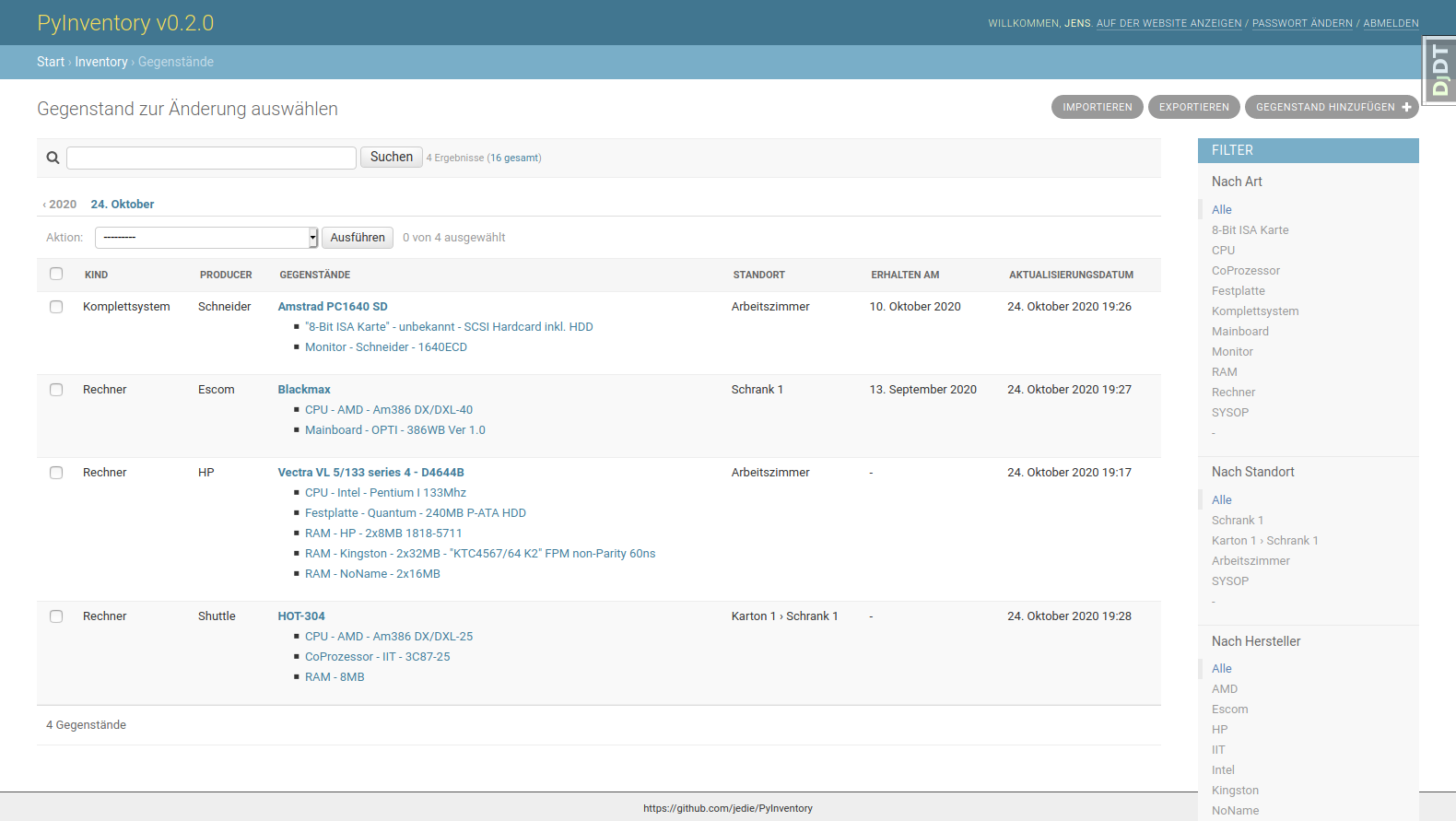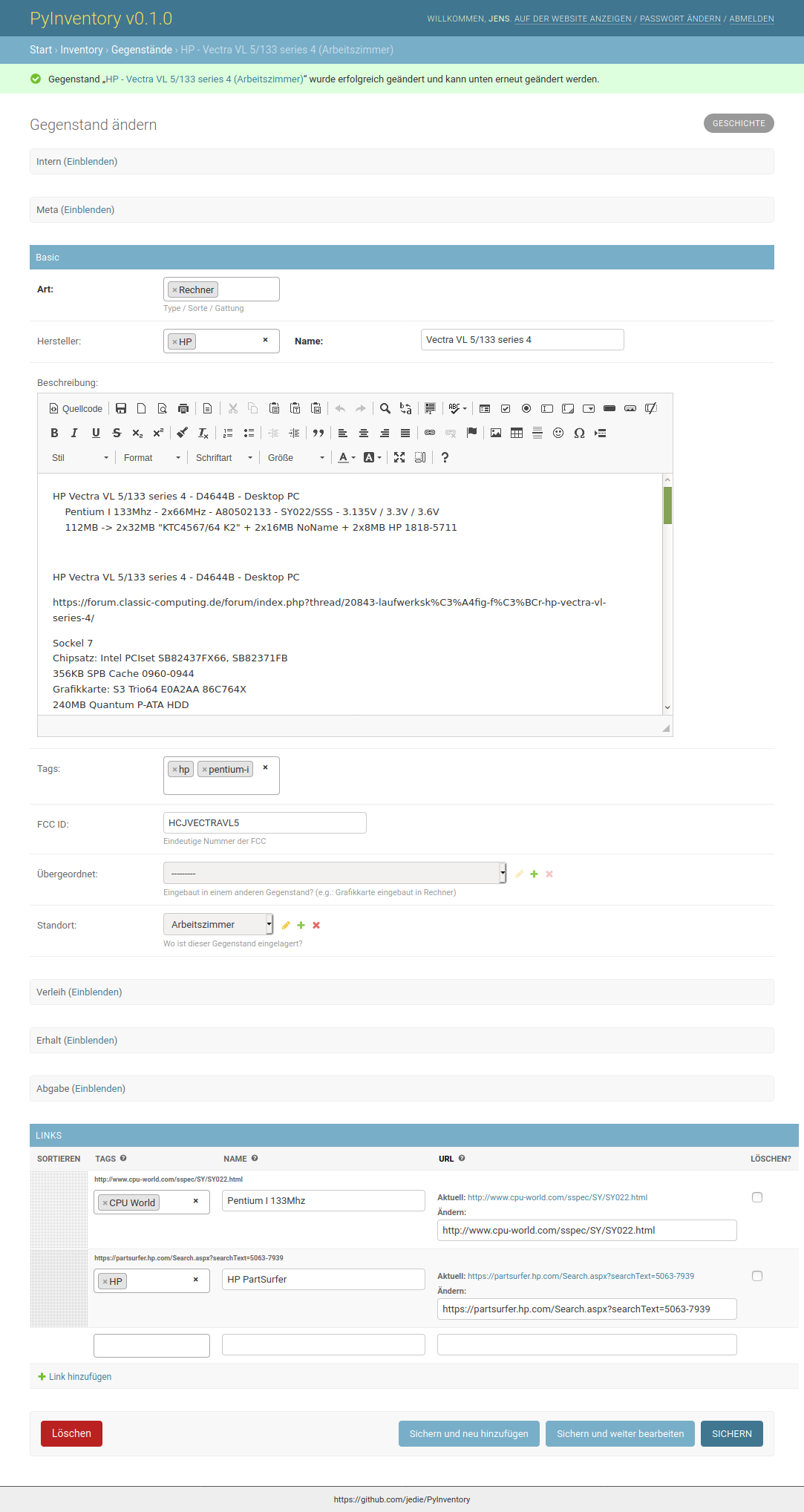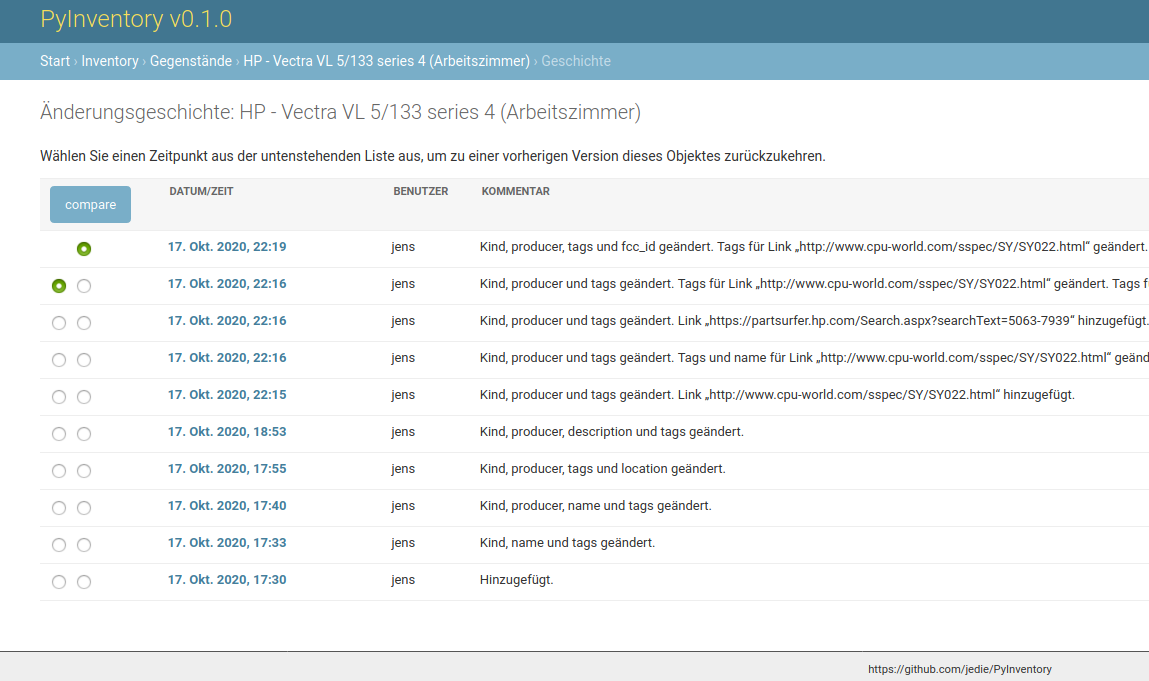| .github | ||
| conf | ||
| scripts | ||
| tests | ||
| .editorconfig | ||
| .flake8 | ||
| .gitignore | ||
| check_process | ||
| LICENSE | ||
| local_test.py | ||
| Makefile | ||
| manifest.json | ||
| poetry.lock | ||
| pyproject.toml | ||
| README.md | ||
| run_pytest.py | ||
PyInventory for YunoHost
This package allows you to install PyInventory quickly and simply on a YunoHost server. If you don't have YunoHost, please consult the guide to learn how to install it.
Pull requests welcome ;)
Overview
PyInventory is a libre web-based management to catalog things including state and location etc. using Python/Django.
Screenshots
Settings and upgrades
Almost everything related to PyInventory's configuration is handled in a "../conf/settings.py" file.
You can edit the file /opt/yunohost/pyinventory/local_settings.py to enable or disable features.
Test sending emails:
ssh admin@yourdomain.tld
root@yunohost:~# cd /opt/yunohost/pyinventory/
root@yunohost:/opt/yunohost/pyinventory# source venv/bin/activate
(venv) root@yunohost:/opt/yunohost/pyinventory# ./manage.py sendtestemail --admins
Background info: Error mails are send to all settings.ADMINS. By default the YunoHost admin is inserted here. To check current ADMINS run:
(venv) root@yunohost:/opt/yunohost/pyinventory# ./manage.py sendtestemail --admins
If you prefere to send error emails to a extrnal email address, just do something like this:
echo "ADMINS = (('Your Name', 'example@domain.tld'),)" >> /opt/yunohost/pyinventory/local_settings.py
To check the effective settings, run this:
(venv) root@yunohost:/opt/yunohost/pyinventory# ./manage.py diffsettings
Miscellaneous
SSO authentication
SSOwat is fully supported via django_ynh:
- First user (
$YNH_APP_ARG_ADMIN) will be created as Django's super user - All new users will be created as normal users
- Login via SSO is fully supported
- User Email, First / Last name will be updated from SSO data
Links
- Report a bug about this package: https://github.com/YunoHost-Apps/pyinventory_ynh
- Report a bug about PyInventory itself: https://github.com/jedie/PyInventory
- YunoHost website: https://yunohost.org/
Developer info
package installation / debugging
Please send your pull request to https://github.com/YunoHost-Apps/pyinventory_ynh
Try 'main' branch, e.g.:
sudo yunohost app install https://github.com/YunoHost-Apps/pyinventory_ynh/tree/master --debug
or
sudo yunohost app upgrade pyinventory -u https://github.com/YunoHost-Apps/pyinventory_ynh/tree/master --debug
Try 'testing' branch, e.g.:
sudo yunohost app install https://github.com/YunoHost-Apps/pyinventory_ynh/tree/testing --debug
or
sudo yunohost app upgrade pyinventory -u https://github.com/YunoHost-Apps/pyinventory_ynh/tree/testing --debug
To remove call e.g.:
sudo yunohost app remove pyinventory
Backup / remove / restore cycle, e.g.:
yunohost backup create --apps pyinventory
yunohost backup list
archives:
- pyinventory-pre-upgrade1
- 20201223-163434
yunohost app remove pyinventory
yunohost backup restore 20201223-163434 --apps pyinventory
Debug installation, e.g.:
root@yunohost:~# ls -la /var/www/pyinventory/
total 18
drwxr-xr-x 4 root root 4 Dec 8 08:36 .
drwxr-xr-x 6 root root 6 Dec 8 08:36 ..
drwxr-xr-x 2 root root 2 Dec 8 08:36 media
drwxr-xr-x 7 root root 8 Dec 8 08:40 static
root@yunohost:~# ls -la /opt/yunohost/pyinventory/
total 58
drwxr-xr-x 5 pyinventory pyinventory 11 Dec 8 08:39 .
drwxr-xr-x 3 root root 3 Dec 8 08:36 ..
-rw-r--r-- 1 pyinventory pyinventory 460 Dec 8 08:39 gunicorn.conf.py
-rw-r--r-- 1 pyinventory pyinventory 0 Dec 8 08:39 local_settings.py
-rwxr-xr-x 1 pyinventory pyinventory 274 Dec 8 08:39 manage.py
-rw-r--r-- 1 pyinventory pyinventory 171 Dec 8 08:39 secret.txt
drwxr-xr-x 6 pyinventory pyinventory 6 Dec 8 08:37 venv
-rw-r--r-- 1 pyinventory pyinventory 115 Dec 8 08:39 wsgi.py
-rw-r--r-- 1 pyinventory pyinventory 4737 Dec 8 08:39 settings.py
root@yunohost:~# cd /opt/yunohost/pyinventory/
root@yunohost:/opt/yunohost/pyinventory# source venv/bin/activate
(venv) root@yunohost:/opt/yunohost/pyinventory# ./manage.py check
PyInventory v0.8.2 (Django v2.2.17)
DJANGO_SETTINGS_MODULE='settings'
PROJECT_PATH:/opt/yunohost/pyinventory/venv/lib/python3.7/site-packages
BASE_PATH:/opt/yunohost/pyinventory
System check identified no issues (0 silenced).
root@yunohost:~# tail -f /var/log/pyinventory/pyinventory.log
root@yunohost:~# cat /etc/systemd/system/pyinventory.service
root@yunohost:~# systemctl reload-or-restart pyinventory
root@yunohost:~# journalctl --unit=pyinventory --follow
local test
For quicker developing of PyInventory in the context of YunoHost app, it's possible to run the Django developer server with the settings and urls made for YunoHost installation.
e.g.:
~$ git clone https://github.com/YunoHost-Apps/pyinventory_ynh.git
~$ cd pyinventory_ynh/
~/pyinventory_ynh$ make
install-poetry install or update poetry
install install PyInventory via poetry
update update the sources and installation
local-test Run local_test.py to run pyinventory_ynh locally
~/pyinventory_ynh$ make install-poetry
~/pyinventory_ynh$ make install
~/pyinventory_ynh$ make local-test
Notes:
- SQlite database will be used
- A super user with username
testand passwordtestis created - The page is available under
http://127.0.0.1:8000/app_path/


